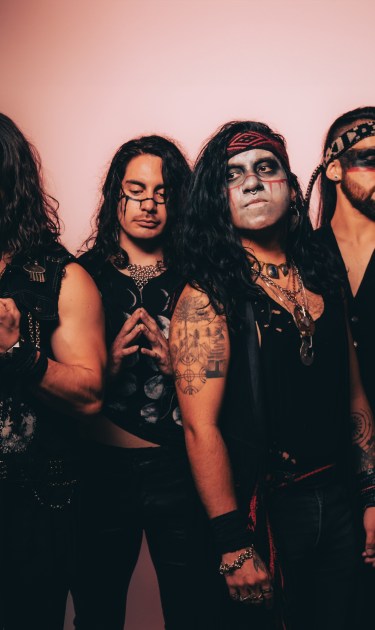Just like roots crack through concrete and help trees bloom, this Chilean band sprouted from a seed passed down by their ancestors. Slowly and powerfully, Mawiza has broken through prejudice, language barriers, discrimination, and even the strict rules of metal itself. The result is a project that not only delivers a fresh, innovative, challenging, and intensely heavy sound but also honors the history, worldview, and struggles of the Indigenous Mapuche people.
Awka, Mawiza’s vocalist and guitarist, was born in Santiago de Chile. Like his bandmates — Karü, Zewü, and Txalkan —, he is a child and grandchild of Mapuches who, for various reasons, left Wallmapu — the ancestral territory of the Mapuche — and settled in the capital city of Chile. Like many young people of his generation, Awka grew up influenced by the stories of his ancestors and by global cultural movements, especially rock music.
“I saw metal as a space of safety and resistance,” says Awka. He explains that he was introduced to rock at an early age by his uncles, who played him songs from bands like Metallica. As he grew older, the distortion and rawness of the music became tools for self-reflection and ways to tell the story of his people.
Influenced by Sepultura, he began creating music in search of a distinctly Latin American sound, not just by incorporating regional rhythms, but by rooting the essence of the music in the continent’s deep cultural foundations. This led to the formation of a band called Nunca Seremos Dichosos. But for Awka, the journey was far from complete. Encouraged by his family, he began exploring the history and worldview of the Mapuche at a deeper level. His desire to understand himself as a 21st-century Indigenous person — influenced by foreign cultures but profoundly connected to his roots — led him to rethink his music and his path.

Unlike many ancestral peoples in the Americas, the Mapuche remained free for centuries. Not even the Spanish Empire managed to conquer them. It wasn’t until 1883, after a bloody military campaign by both the Chilean and Argentinian armies, that the Mapuche were subdued. This campaign not only cost them their land, but also devastated their culture. Their ancestral language, Mapuzugun (also spelled Mapudungun), was banned for decades. Despite this, the Mapuche people have always embodied rebellion and resistance. This spirit began to stir inside Awka, prompting him to question how and why he engaged with metal. These reflections, combined with the political and social unrest in Chile — especially the massive 2019 protests against President Sebastián Piñera — pushed them to rethink the band’s direction.
After a lineup change, Nunca Seremos Dichosos became Mawiza. Their first album, Kollong (2019), featured songs sung in a mix of Spanish and Mapuzugun. But after much thought, the band decided to switch entirely to their ancestral language. More than that, they committed themselves fully to Mapuche tradition. “The major disruption that happens with Mawiza is this idea of positioning ourselves as Indigenous, not just for performance onstage, but as a way of living as Mapuche on a daily basis,” explains Awka.
This commitment goes beyond using traditional chants or instruments like the kultrún drum. It involves merging ancestral tradition with metal, which means rethinking their relationship with their instruments, their music, and the rock culture itself. It even meant traveling to Wallmapu to speak with elders, ask for guidance and permission, and take part in sacred ceremonies. And though the elders aren’t particularly fond of metal, they are happy to see young people learning the language and spreading their stories and struggles across the globe.

For the Mapuche, dreams are important, as is the relationship with the place one inhabits. Mawiza means “mountain,” and their music is deeply inspired by the natural world that surrounds cities like Santiago. In their new album Üll (2025), released via Season of Mist, the band explores that mystical relationship with the land, tradition, and the present through sound. For instance, “Pinhza Ñi Pewma” is a song inspired by the flapping of a hummingbird’s wings. “Ngulutu” tells the story of a great storm, and “Mamül Reke” denounces how logging companies are destroying Mapuche territory.
“The major disruption that happens with Mawiza is this idea of positioning ourselves as Indigenous, not just for performance onstage, but as a way of living as Mapuche on a daily basis.”
This fusion of worlds and cultures has led Mawiza to a form of metal that doesn’t fit within traditional standards. Their sound incorporates elements of melodic death metal, nu-metal, and groove metal, while also drawing influence from modern bands like Gojira (with whom they collaborated on “Ti Inan Paw-Pawkan”) and Knocked Loose. But there’s also a certain darkness and heaviness that comes from Mapuche rhythms. This music doesn’t just make you headbang, it makes you zapatear, stomping the ground with your feet in a way reminiscent of First Nations’ Powwows.
Mawiza invites listeners to decolonize metal and reclaim it, giving it a deeper meaning. “We’re a cultural shock for the Western world, but also for the Mapuche world,” says Awka. “Metal is just the outer layer. Underneath is everything we’ve learned. That’s who we really are.”

Mawiza is a way to heal a deep wound, and it is also the way through which these musicians connect with something much bigger than themselves. It’s a kind of sonic force that breaks all boundaries and brings us closer to something incredibly powerful.
